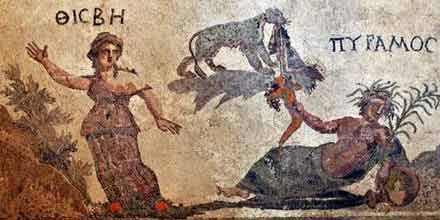Mulberries and legend of Thisbe and Pyramus

Mulberry tree was for the Greeks a plant rich in symbolism, consecrated to the god Pan for what it symbolized: intelligence and passion.
The legend of Pyramus and Thisbe is linked to the mulberry tree, made famous by
Roman poet Ovid in the Metamorphoses. Legend has it that the two young Babylonians Thesebe and Piran, very much in love, were locked up in the cellar by their respective families because they did not like their love. The two young people, however, through a crack, managed to communicate with each other and agreed on a plan to escape and live their love. According to the plan, the two young men, after escaping, had to meet in the woods near a mulberry tree. Thisbe was the first to run away but, seeing a lioness in the woods stained with blood, she ran away. In the run he lost his shawl which the lioness tore. Pyramus, having reached the meeting place, saw Thisbe's shawl torn and bloodied and thought that his beloved had been killed. Desperate, he pulled a dagger from his jacket and committed suicide. In the meantime, Thisbe had returned to the Mulberry tree and saw Pyramus dying in a lake of blood. Before he died, he whispered
something to her lover and then he pierced himself with the same dagger taking his own life.
According to the legend, the blood of the two young lovers transformed the fruits of the Mulberry tree, usually white, into black fruits with a red colored juice very heated.
For the tragic end of their love, Pyramus and Thisbe are often referred to as the Sicilian Romeo and Juliet .